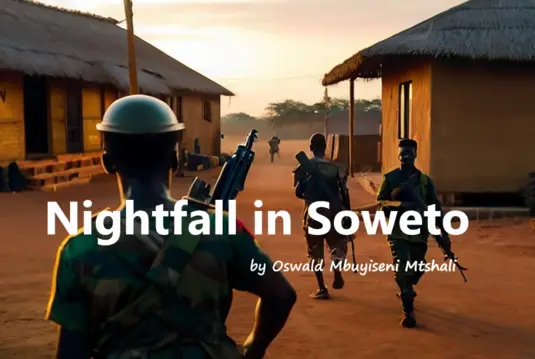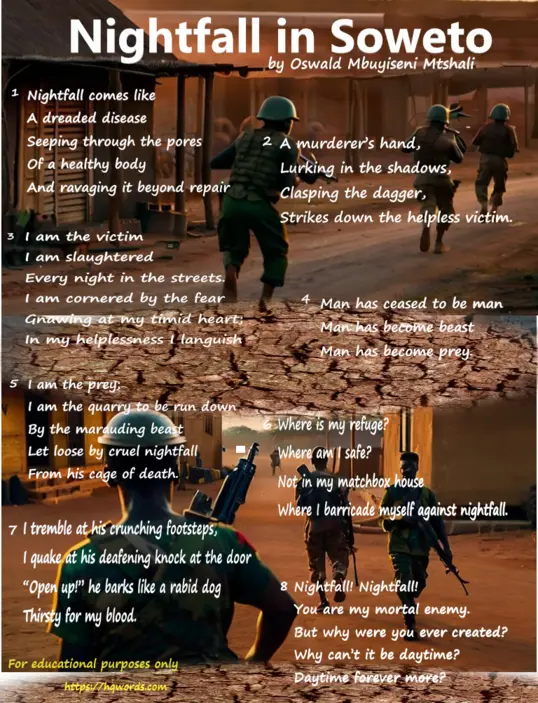
Nightfall in Soweto – Analysis
Nightfall in Soweto was written by Oswald Mbuyiseni Mtshali
August 8, 2021
Nightfall in Soweto
by Oswald Mbuyiseni Mtshali
Nightfall comes like A dreaded disease Seeping through the pores Of a healthy body And ravaging it beyond repair A murderer’s hand, Lurking in the shadows, Clasping the dagger, Strikes down the helpless victim. I am the victim I am slaughtered Every night in the streets. I am cornered by the fear Gnawing at my timid heart; In my helplessness I languish Man has ceased to be man Man has become beast Man has become prey. I am the prey; I am the quarry to be run down By the marauding beast Let loose by cruel nightfall From his cage of death. Where is my refuge? Where am I safe? Not in my matchbox house Where I barricade myself against nightfall. I tremble at his crunching footsteps, I quake at his deafening knock at the door “Open up!” he barks like a rabid dog Thirsty for my blood. Nightfall! Nightfall! You are my mortal enemy. But why were you ever created? Why can’t it be daytime? Daytime forever more?

Themes
Nightfall in Soweto consists of 8 unequal stanzas. The themes of the poem include –
– Brutality – the destruction of lives as an effect of oppression.
– Fear – is instigated by the dreadful events that take place at nightfall.
– Insecurity – captured in the description of the oppression of the blacks. The anxiety as the white policemen asked them to open their doors at nightfall to the white policemen.
– Apartheid – shown in lack of equality between the blacks and whites in South Africa at his time.
– Injustice – The blacks were treated poorly and brutalized at night with no fair trial.
Read Also:
Summary of the Lion and the Jewel by Wole Soyinka
Literary devices
The author paints a picture of nightfall that shows it as a time of terror, fear, anguish, and a time to be dreaded. This image contradicts the common idea of nightfall as a time to rest and a time to renew one’s energy. The author made use of several literary devices to bring his message home. Some of the poetic devices include –
– Exclamation (lines 32, 33)
– Personification (lines 33)
– Simile (line 1)
– Alliteration (line 2)
– Anaphora (lines 16, 17, &18)
Generally, Oswald Mtshali’s poetry reflects his harsh experiences and those of other blacks during the apartheid. His use of imagery, similes, and irony creates rich emotional effects.
Symbols
‘Nightfall in Soweto’ symbolizes terror – the terror of the violence experienced by the South Africans Blacks during the apartheid. Nightfall brings with it fear, insecurity, and violence. The writer describes the danger and agony the people of Soweto felt at nightfall in vivid terms that state his feelings and experiences. The fear and anguish were in the use of symbolism by the author. Some examples include the descriptors like – “cruel nightfall”, and the imagery showing the actions that come at nightfall – “deafening knock”, “rabid dog”.
In my helplessness I languish 15
Man has ceased to be man
Man has become beast
Man has become prey.
I am the prey;
I am the quarry to be run down 20
By the marauding beast
Oswald Mtshali compared nightfall to a dreaded disease. A disease that is so damaging that the effects are irreparable. He highlights the helplessness and pain of the haunted. The ferocious acts, inhumanities, and atrocities of the white policemen were also clearly stated in lines 17, 18, 19
Man has become beast
Man has become prey.
I am the prey;
He notes the low estate of his dwelling by describing his house as a matchbox. The worry and desperation are seen in the tone as the writer described his fears as the oppressor approaches. There is rising anxiety as nightfall approaches as he dreads the deeds that come with nightfall.
About Oswald Mbuyiseni Mtshali
Oswald Mbuyiseni Mtshali is a South African poet born in Vryheil, Natal, on January 17, 1940. He lives in the South West Town (Soweto), Johannesburg. Like many other blacks at the time, records show that he served the whites, working as a messenger. ‘Nightfall in Soweto’ describes his experiences and observations of the sufferings of the blacks during the apartheid. The dread that came at nightfall being its core.
Oswald M. Mtshali has written in different languages – Zulu, English, and Afrikaans. Records show that he studied at Columbia University and lives in Soweto. Oswald M. Mtshali is a published author. He is also known to have worked as an educator. He once was a vice-principal of Pace College in Soweto.
Oswald won the Oliver Schreiner Prize for 1974 (Britannica).

[…] Nightfall in Soweto – Analysis […]
February 25, 2024 at 3:54 pm